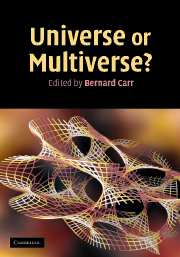Book contents
- Frontmatter
- Contents
- List of contributors
- Preface
- Acknowledgements
- Editorial note
- Part I Overviews
- Part II Cosmology and astrophysics
- Part III Particle physics and quantum theory
- 14 Quarks, electrons and atoms in closely related universes
- 15 The fine-tuning problems of particle physics and anthropic mechanisms
- 16 The anthropic landscape of string theory
- 17 Cosmology and the many worlds interpretation of quantum mechanics
- 18 Anthropic reasoning and quantum cosmology
- 19 Micro-anthropic principle for quantum theory
- Part IV More general philosophical issues
- Index
- References
17 - Cosmology and the many worlds interpretation of quantum mechanics
Published online by Cambridge University Press: 05 July 2014
- Frontmatter
- Contents
- List of contributors
- Preface
- Acknowledgements
- Editorial note
- Part I Overviews
- Part II Cosmology and astrophysics
- Part III Particle physics and quantum theory
- 14 Quarks, electrons and atoms in closely related universes
- 15 The fine-tuning problems of particle physics and anthropic mechanisms
- 16 The anthropic landscape of string theory
- 17 Cosmology and the many worlds interpretation of quantum mechanics
- 18 Anthropic reasoning and quantum cosmology
- 19 Micro-anthropic principle for quantum theory
- Part IV More general philosophical issues
- Index
- References
Summary
Introduction
Although the mathematical structure of quantum mechanics was understood within a few years after it was invented, numerous quantum paradoxes still disturb ‘simple-minded’ physicists. Most of them, as ‘naïve realists’, would probably never take Bohr's own over-philosophical and over-complicated treatment of these paradoxes seriously if they realized the philosophical consequences of the Copenhagen interpretation. To make my meaning clearer, let me quote Bohr's answer to Professor Hoffding's question regarding the double-slit experiment [1]. Bohr was asked: ‘What can the electron be said to be in its travel from the point of entry to the point of detection?’ And he replied: ‘To be? To be? What does it mean to be?’ However, if one questions the existence of microscopic constituents of macroscopic bodies, then the next logical step would be to question the existence of the macroscopic bodies and even ourselves.
Needless to say, very few (if any) of us, when making experiments or analyzing their results, address the question of what it means ‘to be’ every time. Even in the context of elementary particles, probably nobody doubts that the particles exist and somehow travel from the point of entry to the point of detection. Moreover, within the accuracy allowed by the uncertainty relation, these particles can be localized and described just as well as macroscopic ‘classical’ objects.
Information
- Type
- Chapter
- Information
- Universe or Multiverse? , pp. 267 - 274Publisher: Cambridge University PressPrint publication year: 2007
References
Accessibility standard: Unknown
Why this information is here
This section outlines the accessibility features of this content - including support for screen readers, full keyboard navigation and high-contrast display options. This may not be relevant for you.Accessibility Information
- 1
- Cited by
